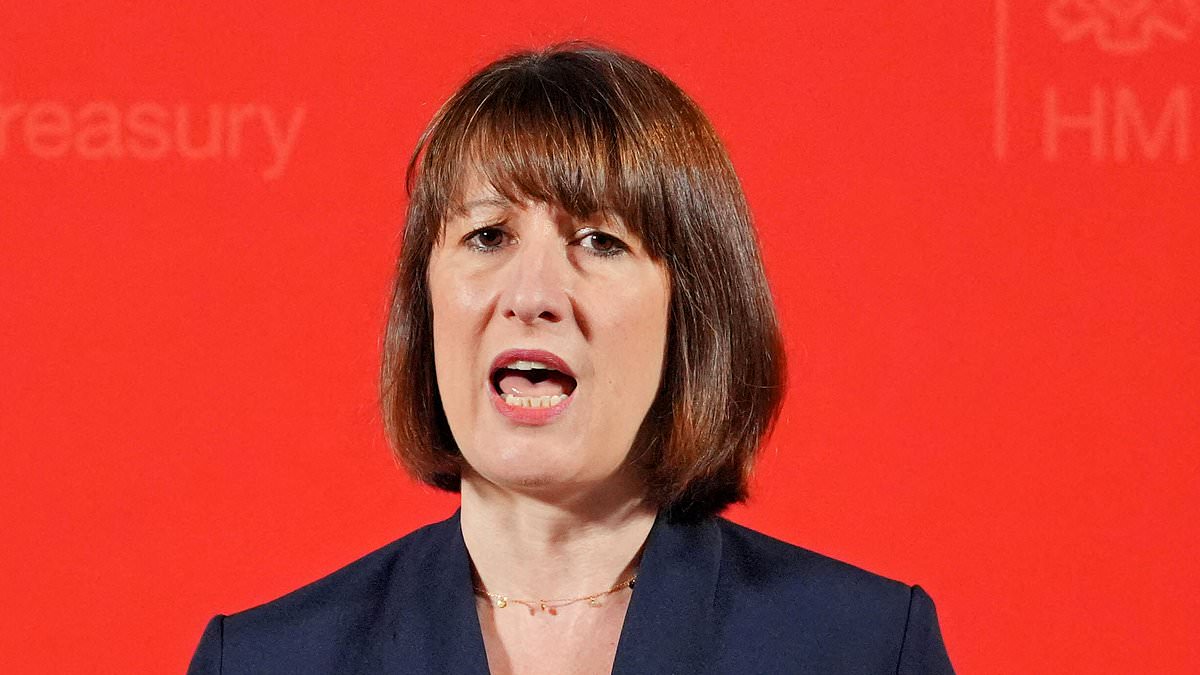Chancellor Rachel Reeves came under fire last night after her doom-laden claims about the Tories’ economic legacy were left in tatters.
In the latest evidence of the UK’s robust recovery, figures showed that growth this year is the fastest in the G7 group of advanced nations, while inflation remains subdued and unemployment falls.
Yet, in what is seen as preparing the public for tax rises, Ms Reeves insists that Labour’s economic inheritance is the worst since the Second World War.
Critics expressed incredulity at the claim, coming as the Chancellor has been doling out huge pay settlements to public sector workers.
One expert said Ms Reeves’ comments were ‘categorically false’, while another described the latest figures as ‘another gangbusters quarter’ for the UK.
Former Tory chancellor Jeremy Hunt said his successor’s gloomy talk ‘will not wash with the public’, adding that the latest figures ‘are yet further proof that Labour have inherited a growing and resilient economy’.
Tory leadership contenders lined up to slam the new Chancellor as she prepares to raise taxes in her first Budget. Dame Priti Patel said: ‘Reeves spent the election lying to the British public about her planned tax rises for hard-working British families and is now simply attempting to shift the blame.’
Tom Tugendhat added: ‘Under a Conservative government, we had economic growth. Under Labour, the only growth we’re going to see is the pile of cash in the union barons’ pockets.’
The Office for National Statistics yesterday said gross domestic product (GDP) grew by 0.6 per cent in the second quarter of the year, after growing by 0.7 per cent in the first quarter.
That equates to 1.3 per cent for the first half of the year and means that the last six months of the Tory government saw UK growth outpace its G7 rivals, including the United States.
Inflation is at 2.2 per cent and unemployment has fallen from 4.4 per cent to 4.2 per cent. And a painful period for mortgage borrowers is starting to ease as markets bet that the Bank of England’s interest rate cut this month will be followed by two more this year.
Yet Ms Reeves continues to foreshadow tax hikes, saying: ‘The new Government is under no illusion as to the scale of the challenge we have inherited after more than a decade of low economic growth and a £22 billion black hole in the public finances.’
Chief Secretary to the Treasury Darren Jones added: ‘What we inherited from the Conservatives was the worst fiscal inheritance since the Second World War.’ But Kallum Pickering, chief economist at City broker Peel Hunt, said: ‘It is categorically false to say that the UK economy is in bad shape.’
Banks, consumer credit, and mortgage borrowing are all healthy, he said. And while the public finances are in poor shape, that has not been caused by ‘bad management of the economy’, Mr Pickering added, but by the pandemic and the surge in energy prices caused by Russia’s invasion of Ukraine.
‘Now that the unusual shocks have faded, the economy is growing because fundamentally the private sector is in good shape,’ he said.
The deficit inherited by Labour – the amount a government borrows every year as a percentage of GDP – stands at 4.5 per cent. That is much smaller than the 10.3 per cent deficit that David Cameron and George Osborne had to grapple with in 2010.
Unemployment at the end of Rishi Sunak’s term in office, at 4.2 per cent, is about half the level it was in 2010, when it stood at 7.9 per cent.
Ben Zaranko, of the Institute for Fiscal Studies, said: ‘It’s clear that the economic inheritance isn’t the worst since World War Two: the economy is growing, inflation is back around target, unemployment is low.’
Investec economist Ellie Henderson said: ‘When it comes to the UK, the sun appears to be breaking through the storm clouds.’ Yael Selfin, of KPMG, described it as ‘another gangbusters quarter’ for the UK.
Mr Tugendhat said: ‘Labour’s ability to summon a pot of cash for union bosses, while simultaneously claiming a £22 billion hole in the nation’s finances, was a clear sign that they had a plan all along: higher taxes, more spending, and no investment in the future.’
Mel Stride, another Tory leadership contender, added: ‘Pay restraint was a key factor in the Conservatives’ success in bringing inflation back down, meaning the Bank can now begin to cut rates. If Labour’s giveaways mean interest rates stay high for longer, homeowners will pay the price.’
